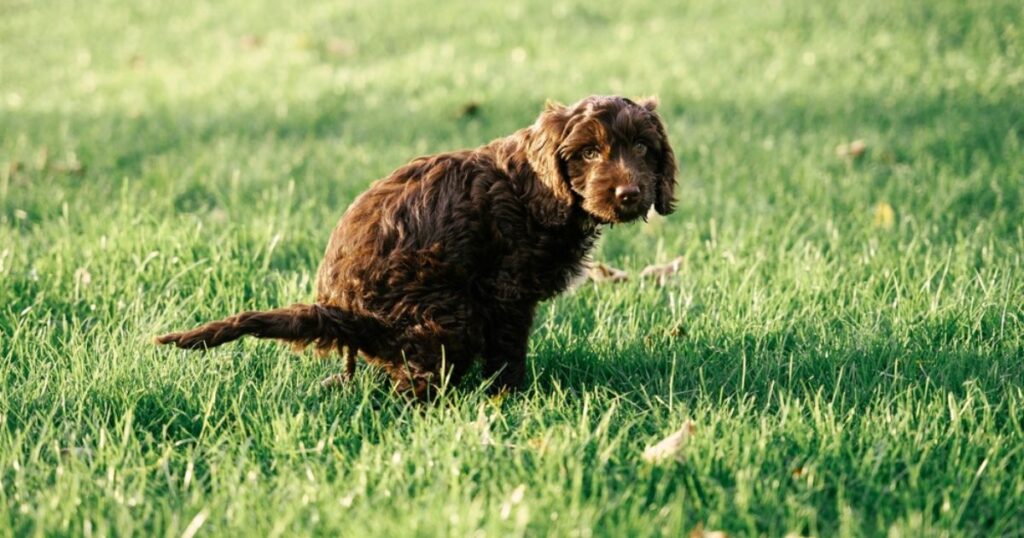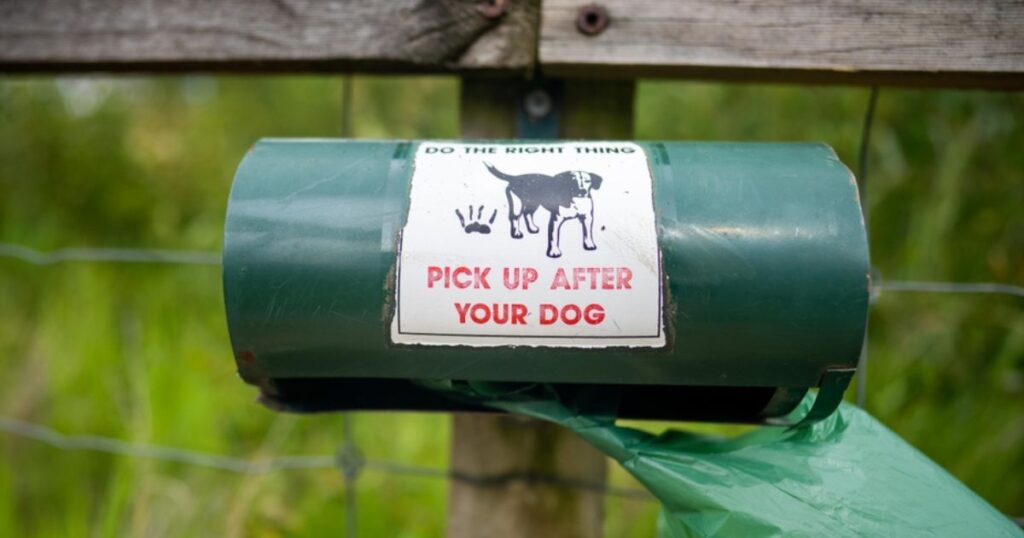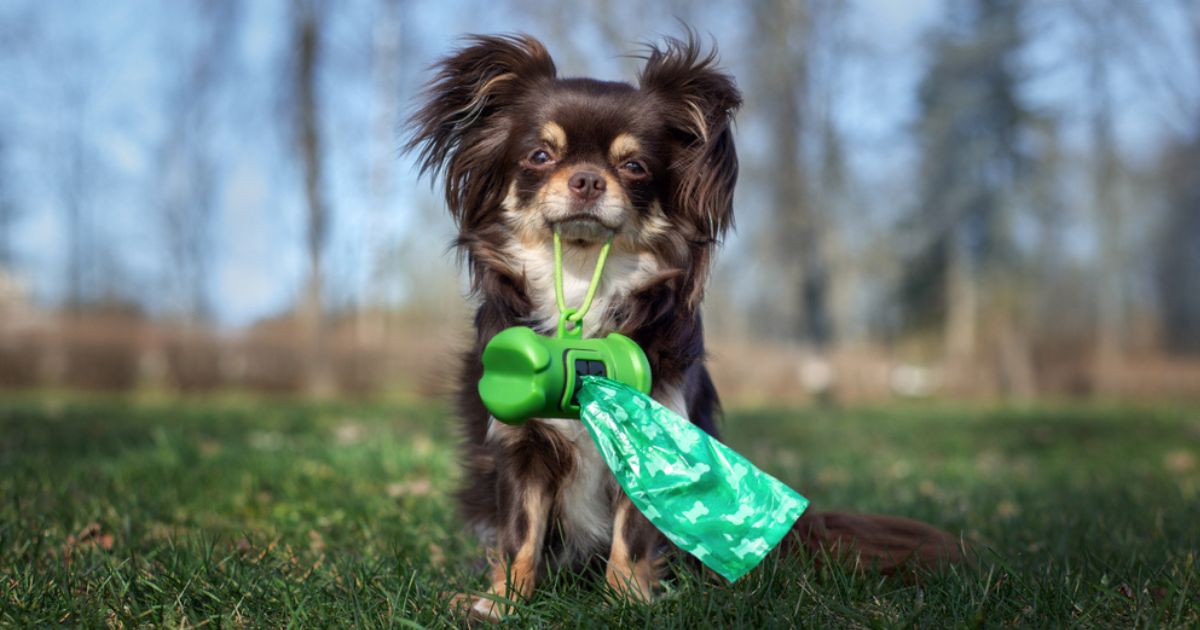Key Points
- Dog poop is bad for the environment because it contains elements that can run off into rivers, streams, and lakes, polluting the water.
- It’s also important to dispose of dog poop because it contains pathogens and parasites that can cause disease in dogs, people, and wildlife.
- Finally, your dog’s poop can offer important clues about their health.
When it comes to pooping, no two pups are alike. Some are exceptionally considerate, like this dog named Kaiya, who thoughtfully poops right next to a garbage can. And then there’s this dog named Cookie, who loves the beach, decides it’s a toilet, and figures you only live once.
No matter which type of pooper your pup is, it’s our job as pet parents to pick up after them. You may be tempted to shrug it off and leave your dog’s poop — it’s the same as dumping a little pile of fertilizer, right? As it turns out, nope — and it’s not only dangerous for the environment but also for humans, dogs, and wildlife.
On the heels of Earth Day, the last week of April is National Scoop the Poop Week. In the spirit of the holiday, here’s everything you need to know when it comes to why dog poop is bad for the environment (and everyone else).
Is dog poop bad for the environment?
First off, we’ve all had a moment where we had to leave poop behind — you didn’t have a bag and no one else was around to lend you one. It happens.
But dog poop is actually really bad for the environment. While many people think of it as fertilizer, it’s not quite so simple, says Andy Yencha, a water resources educator at Penn State Extension in Carlisle, Pennsylvania.
While dog poop contains some of the same nutrients as actual fertilizers, Yencha says too much does a lot more harm than good.
“Dog poop is rich in the nutrients nitrogen and phosphorus, which are ‘limiting nutrients’ in natural waterways,” Yencha explains. “This means that if extra amounts of these nutrients wash into local waterways, the algae and pond plant populations will grow rapidly since nutrient levels have become higher and no longer limit their growth.”
In short, dog poop is not great for the environment because it can contaminate habitats like lakes, creeks, rivers, ponds, and streams. If your veterinarian has ever told you to avoid letting your dog near water with green scum on the surface, it’s because it could be a harmful algae bloom, toxic to both pets and people — and caused by pollutants like dog poop.
What’s more, dog poop may also use up oxygen and release ammonia, which, when combined with warm waters, can kill fish.
“If we were just talking about one or two dogs in a neighborhood, the risks would be small, but because there are actually thousands of dogs in most neighborhoods, all this dog poop presents a real water quality risk whenever dog owners just leave it to decompose naturally on the ground,” says Yencha. He notes that most of that poop will wash away in the next rainstorm and cause water pollution. In fact, studies have even shown a link between pet waste and water quality.
All the poop that’s left behind can be dangerous for other dogs out and about for a stroll. In one study, intestinal parasites were found in 20 percent of dogs and 85 percent of dog parks across the U.S.
“There are many parasites in addition to bacterial and viral diseases that can be transmitted to other dogs, some wildlife, and even humans if the dog is carrying parasites or is sick from a bacterial or viral disease,” says Lauren Harris, DVM, DACVECC, vice president of medicine at Blue Pearl Pet Hospital. “Other dogs and wildlife could be exposed to dog poop in the environment simply by getting it on their paws and then licking their paws.”
Major concerns include intestinal bacteria such as Campylobacter, Salmonella, Yersinia, and E. coli. Giardia and Cryptosporidium are worrying parasites, and roundworms can cause gastrointestinal issues and other health problems.
One of the best things dog parents can do to reduce their pet’s risk is to make sure their pups are up to date on vaccinations, fecal tests, and preventive medications for intestinal parasites, Harris advises.
Many common tick, flea, and heartworm preventive medications for dogs also protect against intestinal parasites like roundworms and hookworms. Routine fecal tests also screen for several parasites, including roundworms, hookworms, whipworms, coccidia, and giardia.
While these preventive meds and screening tests are a recurring expense for pet parents, they’re key to helping your pet stay parasite-free (and usually a lot less costly than treating parasite-borne illnesses)! Plus, now there are helpful wellness programs out there like the Pumpkin Wellness Club that can help you save up to $460 per year on routine care like preventive meds, fecal tests, vaccines, and so much more — so keeping your pup healthy doesn’t have to break the bank.*

Dog poop is hazardous to human health
As it turns out, dogs and wildlife aren’t the only ones who can become ill from a canine’s poop. Dog feces also poses health risks to humans.
“The pathogens in dog poop, especially E.coli bacteria, can also make people sick if ingested when we unknowingly touch pet waste — when taking off our shoes, for example, and then sticking our fingers in our mouth — or when we are swimming in water that has received dog poop runoff,” Yencha says.
E. Coli can cause serious illness in humans, including in your gut, urinary tract, or other parts of your body, according to the Cleveland Clinic. Salmonella and Giardia are also concerns.
Common worms found in canines, like hookworm and roundworm, are easily transmissible to people. Roundworms can lead to scarring and inflammation in the eye, sometimes resulting in blindness, as well as cause fever, coughing, or abdominal pain, according to the CDC.
Proper disposal of dog poop
With so much at stake, it’s no wonder that there are a lot of options when it comes to dog poop removal. Most pet parents keep it simple by just bagging it and trashing it — especially since there are so many biodegradable bags and pooper scoopers to choose from. But Yencha says that throwing away poop isn’t necessarily the most environmentally sound choice.
According to Yencha, the best dog poop removal option is to flush it down the toilet, sans bag. But take note: Only do this if your home is connected to a public sewer and your community sewer authority allows it. (Yencha recommends calling to ask, and he notes that it is not a good option if you have a private septic system.)
“The next equally-best, or maybe even better, environmental option is to see if your community has any doggie waste drop-off options,” he says. “The third best option is to throw it out in the trash.”
Make sure your plastic bags are biodegradable, since regular plastic bags never fully break down in landfills. If you’re flushing the poop, flush only the poop and dispose of any bag separately. And always remember to wash your hands.
Why compost dog poo?
A fourth, but less popular, option is to compost your dog’s poop. As the EPA notes, it’s simple, inexpensive, and can reduce the volume of dog waste by 50 percent.
However, for most people, composting isn’t the best choice, Yencha says.
“The problem with composting dog feces is that few people have the composting skill to achieve the right mix of nitrogen- and carbon-containing organic waste to achieve the hot temperature — 140 degrees Fahrenheit — necessary to destroy the pathogens that are sometimes present in dog feces,” he explains.
So, for most pet parents, it’s probably best to stick to flushing or trashing your dog’s poop.
Dog poop can give you insights into your pup’s health
Another reason to scoop? It’s a good opportunity to give your dog’s poop a good look — well, at least a quick glance — before you toss it. For most dogs, normal poop is “soft but formed, with a light to medium brown color,” Harris says.
If that describes your pup’s poop, great. But look out for poop that is:
“While not necessarily abnormal for a dog to occasionally have a bout of diarrhea, if this is paired with other symptoms such as vomiting, reduced appetite, poor energy, or other signs, that would be a larger concern,” Harris says. “Black or tarry stool can indicate that there is bleeding within the upper gastrointestinal tract. Fresh red blood in the stool can mean a lot of things, with varying degrees of severity.”
One weird poop probably doesn’t mean much, but if the issue keeps happening — or it’s occurring with other symptoms, your pup may need help.
“If abnormal poop with other symptoms are present, I would call a veterinarian and see if the symptoms may warrant an emergency visit,” says Harris.

Scoop that poop — it’s the right thing to do
When it comes to keeping our dogs healthy, most of us go above and beyond, but picking up poop is rarely a consideration. It looks like that’s changing: The U.S. pet waste management industry has grown 11 percent, to $270 million, in the past five years, and the U.S. pet poop bag market is expected to be worth over $1 billion by 2030.
That’s a lot of people thinking about pet poop.
“Dogs are wonderful, and they contribute so much to our lives that they more than make up for the downsides of managing their waste,” Yencha says. “But dog waste is an environmental problem that, in my opinion, has been largely overlooked until just recently. So do the right thing and pick up your dog’s poop so it does not contaminate our shared water resources and possibly make others sick.”
FAQs
*Pumpkin Wellness Club is marketed and administered by Sprout Wellness Services LLC (d/b/a “Pumpkin Wellness Club”). Pumpkin Wellness Club is not an insurance policy. It is offered as a standalone pet wellness membership program. For full terms, visit wellness.pumpkin.care/membership-agreement.
- https://cfpub.epa.gov/npstbx/files/pet%20care%20fact%20sheet.pdf
- https://dec.ny.gov/environmental-protection/water/water-quality/harmful-algal-blooms
- https://parasitesandvectors.biomedcentral.com/articles/10.1186/s13071-020-04147-6
- https://water.phila.gov/drops/dog-waste/
- https://cfpub.epa.gov/npstbx/files/slc_petwaste.pdf
- https://www.linkedin.com/pulse/north-america-dog-poop-bags-market-dynamics-hmqlf/
- https://www.ibisworld.com/united-states/industry/pet-waste-management-services/6583/
- https://www.cdc.gov/toxocariasis/about/index.html
- https://www.washingtonpost.com/wellness/2024/02/04/dog-poop-parasites-biohazard-disease/
- https://avmcww.com/2020/02/26/parasites-and-poop-the-importance-of-picking-up-after-your-dog/
- https://my.clevelandclinic.org/health/diseases/16638-e-coli-infection



